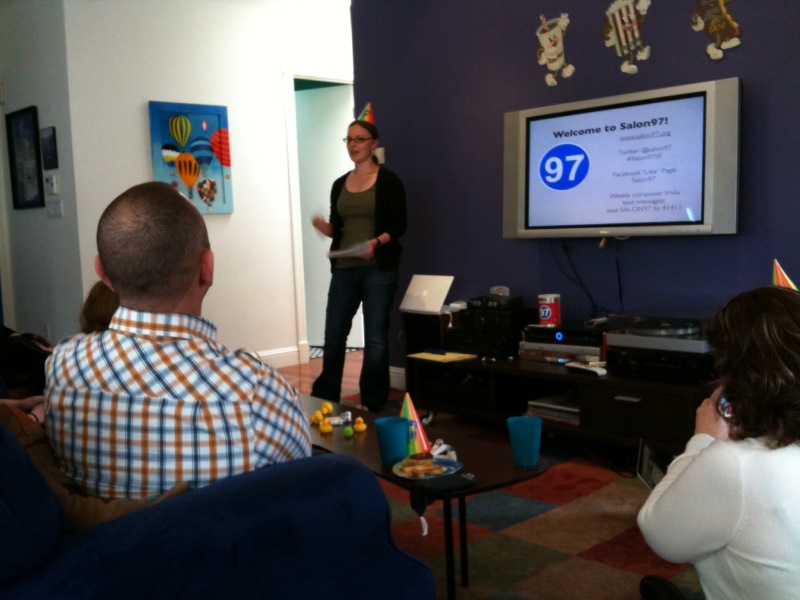
Small cultural gatherings in private homes are all the rage right now in San Francisco. I’ve been involved in a theatre salon for several years; the Home Theatre Festival is happening right now in people’s living rooms across the city; the Mugwumpin performance troupe is producing a show in a motel room on June 7 and the San Francisco Parlor Opera is staging Don Giovanni in a private home through May.
I don’t think there’s anything particularly new about this phenomenon, though it seems more prevalent at the moment. In this age of increasing tech-driven isolation, perhaps people have been missing the intimacy of getting together with a few friends and new acquaintances to participate in artistic activities. Or maybe we’re all just tired of the same old formats and want to try something new.
At the weekend, I attended an hour or so of a lively Salon97 music-appreciation salon. I wish I could have stayed longer at the gathering, organized by a local music lover, Cariwyl Hebert, but I had to be at a concert rehearsal. At any rate, from the short time I spent at Cariwyl’s home in the Upper Haight, I could tell that she and her friends are on to something. The event provides a wonderful high-engagement yet low-key format for listening and discussing music.
I asked Cariwyl (pictured) to tell us about the development of the salon and how it works. She sweetly obliged. Here is what she had to say about it:
In 2008, I visited the South by Southwest Music Festival. Excited to meet many new people and hear a lot of great music of varying varieties, I eagerly added my classical music affiliation to my conference badge thinking this would help pave the way to some great conversations. On the contrary, when fellow attendees saw that I wasn’t involved with indie rock somehow, they looked the other way. This all became rather frustrating after awhile and as the hours turned into days, it became downright depressing. I loved all the music I heard and overall had a great time, but the defeated feeling of the art form I loved the most being irrelevant to everyone else wouldn’t leave me alone. It was time to take matters into my own hands.
What was missing from classical music that made it seem so boring? Why was it that people were willing to stay up all night in crowded over-heated venues to hear indie rock, but not classical music? Was it a lack of intimacy? Community? Informality? Easy access to alcohol? Who wrote the rule that classical music listening couldn’t have all of this?
Two months later I hosted my first classical music listening party. Then another that summer. Every few months I’d pull together a playlist of music constructed around a theme such as American composers (with hot dogs and root beer floats), music in cinema (on Oscar night), living composers, parody in classical music for April Fool’s Day, and scary music for Halloween (with a costume contest). The principles I held to were: a. no experience necessary, b. no question is a dumb one, and c. we’re all here to learn and have fun together.
As time went on, the crowd grew bigger. I started a website, and I named our listening parties Salon97: Classical Music for the Other 97%. The parties were named for the style of event (a salon) and “97” is a tribute to conductor Benjamin Zander’s assertion that perhaps orchestras think three percent of the population likes classical music and that perhaps they strive for four percent. Instead, he says that everyone likes classical music but they just don’t know it yet. I’m after the other 97 percent.
Last Saturday, we celebrated two years of Salon97 with a birthday party that would be typical for any two year old. Balloons, party favors, and Betty Crocker Rainbow Chip cupcakes were everywhere. Our guests wore party hats. We listened to a three piece retrospective of some of audience favorites previously heard at our listening parties. The playlist included:
-William Grant Still’s The American Scene. We listened to the “Southwest” portion of the piece, and everyone was very intrigued by how much the work sounded like a film score to a 1960s western film.
-Arvo Pärt’s Annum per Annum. We discussed the silent portion of the piece and whether it correlated directly to the periods of contemplative silence the composer has taken professionally.
-John Adams’ Short Ride in a Fast Machine. We talked about Charles Ives’ influence on his life as a composer in addition to the energetic and innovative nature of the piece.
Two years ago, I never would have guessed that one small listening party would evolve into a growing community where people who were previously too intimidated to go to the concert hall or buy a classical album would have so much fun listening to classical music. Nor did I anticipate creating a new environment for people to make new friends and business relationships. All of these have happened.
I have big plans for Salon97. A podcast, concert field trips, a classical music 101 video series and more. But fundamentally, the idea behind Salon97 is a small and simple one. Classical music–in jeans or a tuxedo, sober or drunk–belongs to everyone.
